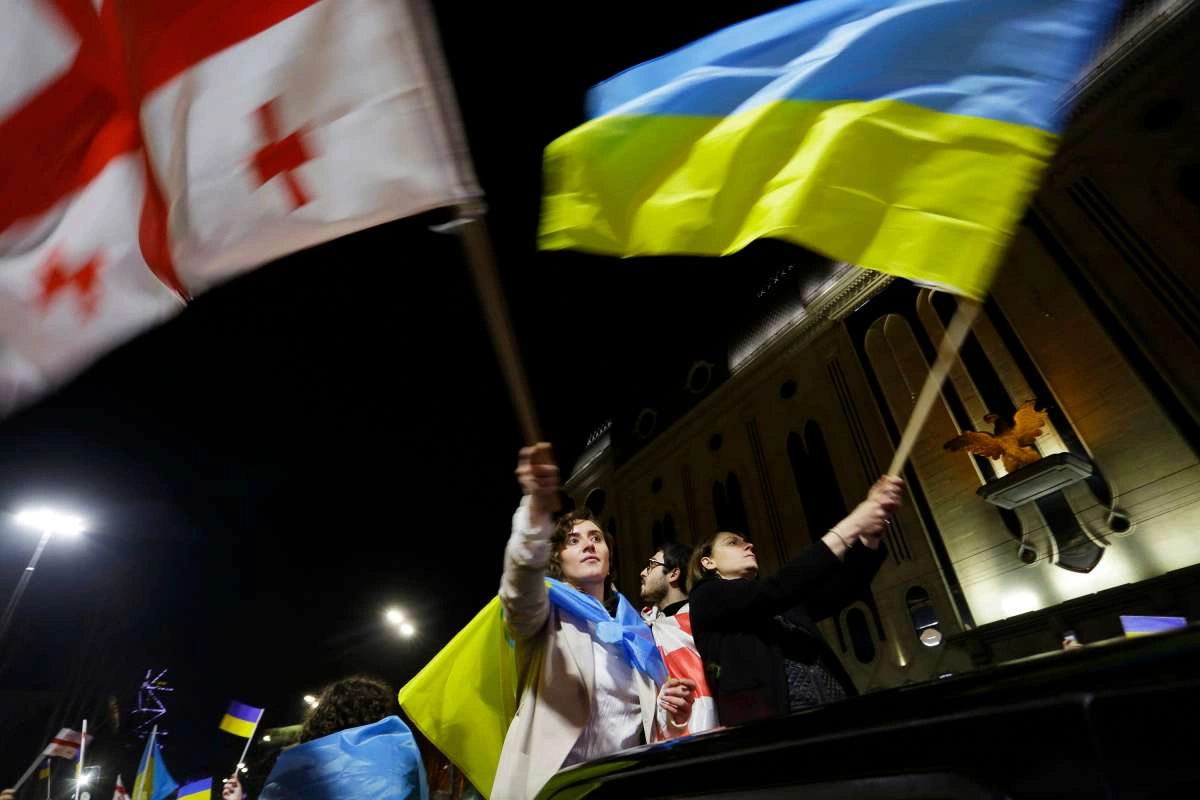
Having Russia as a powerful neighbour is never easy, but things are even harder during the Ukraine war when countries like Georgia, who are politically closer to Kyiv than to Moscow, are forced to walk a diplomatic tightrope.
Thousands of Georgians have been demonstrating against the war in Ukraine since Russia's invasion in late February. Image: Nelson Antoine/Shutterstock
Russia’s invasion of Ukraine sent shockwaves across Eurasia. Particular pressure is being exerted on the countries bordering Russia. Would they openly support Ukraine? Would they abstain from taking open positions? Or would they offer unequivocal support for Russia? Each of these scenarios has its dangers, especially for small countries with limited military protection.
Georgia is one such country that is cautiously balancing explicit political support for Ukraine with the fear of incurring potential Russian wrath that could lead to military or economic moves. Georgia was mentioned along with Ukraine in security demands that Russia addressed to NATO and the US in December 2021. This has put Tbilisi in an uncomfortable spot. Much depends on how the Russian invasion ends. Many fear that there could be Russian demands addressed at Tbilisi, such as Georgia abstaining from joining NATO. After all, with Ukraine, this appears to be Moscow’s primary demand from Kyiv, according to news emerging from talks in Istanbul on Tuesday. Early signs indicate that this demand is likely to be accepted by Ukraine.
If this takes place, similar demands could be extended to Georgia, a country with both NATO and EU membership ambitions. Refusal to drop such policy goals could invite a Russian military response, however enfeebled its forces might be after their unexpectedly poor performance in Ukraine. Considering that Russia invaded Georgia as recently as 2008 and that it still has large occupying forces in Georgia’s regions of Abkhazia and South Ossetia, the potential military threat is very real. Even if it stops short of military solutions, Russia will still retain a wide range of geopolitical tools to coerce Georgia.
This wider picture explains the caution that the Georgian government has professed over the past month. Tbilisi decided not to join anti-Russian sanctions in a move that earned praise from Moscow. However, this tactical approach has complicated ties between Ukraine and Georgia, and at one point, Kyiv recalled its ambassador from the country. Meanwhile, ordinary Georgians have expressed unparalleled support to the Ukrainian defenders by staging large-scale demonstrations and assembling considerable humanitarian support. This seeming dichotomy is exacerbated by internal tensions within Georgian politics, where the opposition and the ruling party are at odds on nearly every issue of both internal and external importance.
Georgia encapsulates the precariousness felt in many countries located close to the ongoing war in Ukraine. Yet while there is undeniably a potential Russian threat, there is also an understanding in Georgia that a new era might be emerging. A strong response from NATO and the EU to the Ukraine situation, coupled with Russia’s limited military effectiveness, underlines the fact that the West is not as divided as had been previously thought. The liberal order, it seems, remains a viable system. Another development is Russia’s sharp economic decline. This decline is likely to be long-term, with palpable effects on Georgia’s own economy and security environment. A weaker, sanctioned Russia also means deep economic troubles for the two occupied Georgian territories. This could result in the opening of new avenues for Tbilisi to push for finding at least a limited understanding on economic and security issues with Tskhinvali (South Ossetia) and Sokhumi (Abkhazia).
In the new era, two broad scenarios could be envisaged for the South Caucasus. The region might be caught in an increasingly closed geopolitical space where Russia becomes ever more dominant. Or, conversely, a period of opportunities could be emerging when a significantly weaker Russia would be unable to impose its will as strongly as it has over the past two decades. With its separatist-held territories, Georgia is looking at these two potential geopolitical directions with both fear and hope. Much will depend not only on the war in Ukraine but how prepared Georgia becomes internally. Weakened by political divisions and poor economic performance, a different, more unified vision for the country’s development is sorely needed. Ideally, the vision should involve limited industrialization to create badly needed workplaces, a fairly unified perspective on the country’s foreign policy trajectory, and an idea of how to address the problem of separatist regions. For now, Georgia is easily distracted and hampered by pressure from Russia and so remains vulnerable.
Share on social media